2023年春人教新目标英语七年级下册Unit 6 I'm watching TV. 单元重要知识点讲义(共33张PPT)
文档属性
| 名称 | 2023年春人教新目标英语七年级下册Unit 6 I'm watching TV. 单元重要知识点讲义(共33张PPT) |  | |
| 格式 | pptx | ||
| 文件大小 | 2.8MB | ||
| 资源类型 | 教案 | ||
| 版本资源 | 人教新目标(Go for it)版 | ||
| 科目 | 英语 | ||
| 更新时间 | 2023-04-02 19:55:38 | ||
图片预览

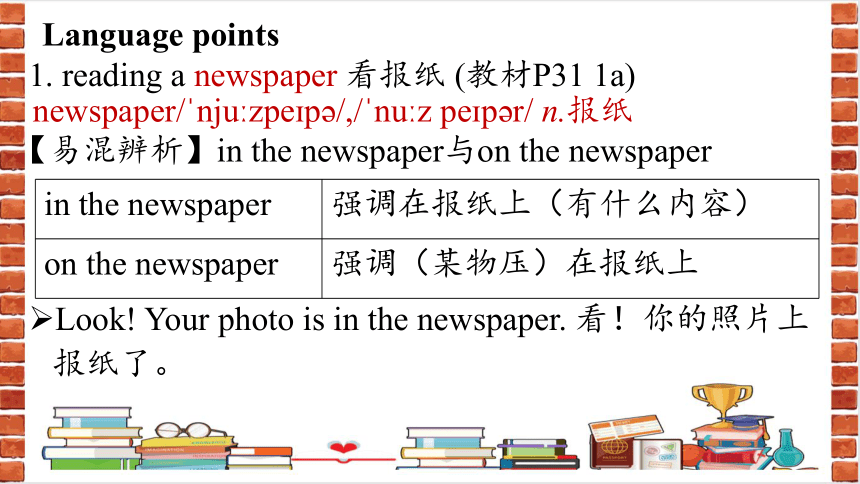
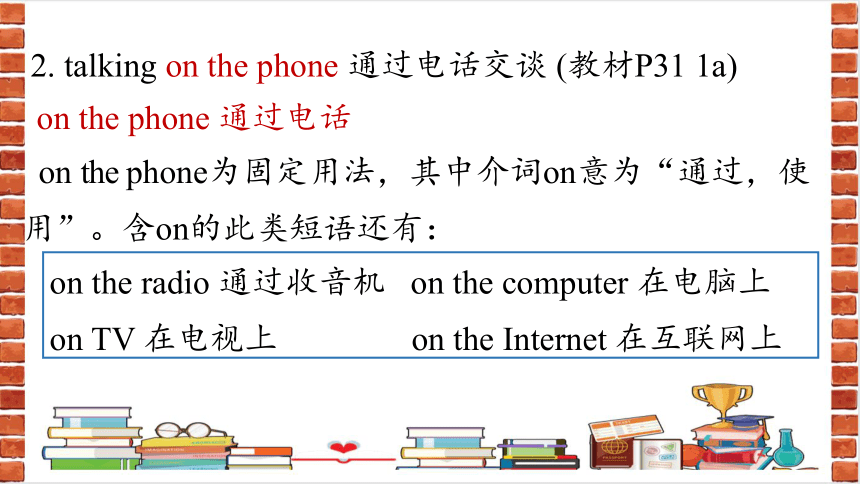
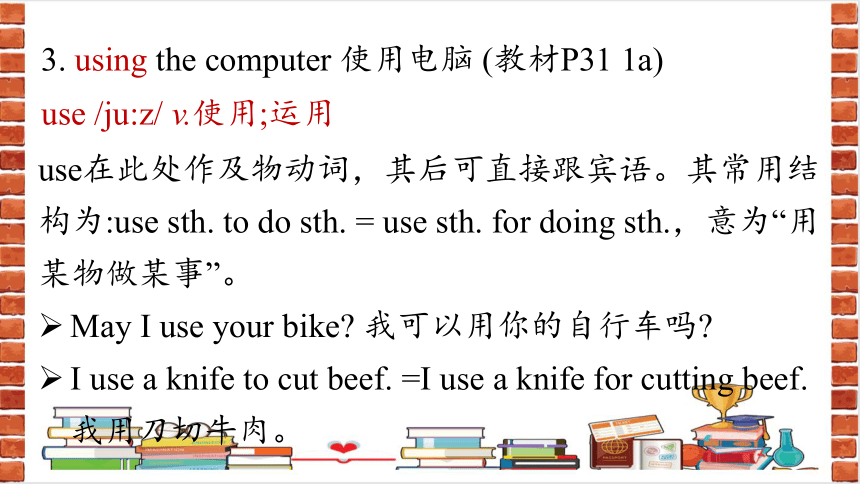
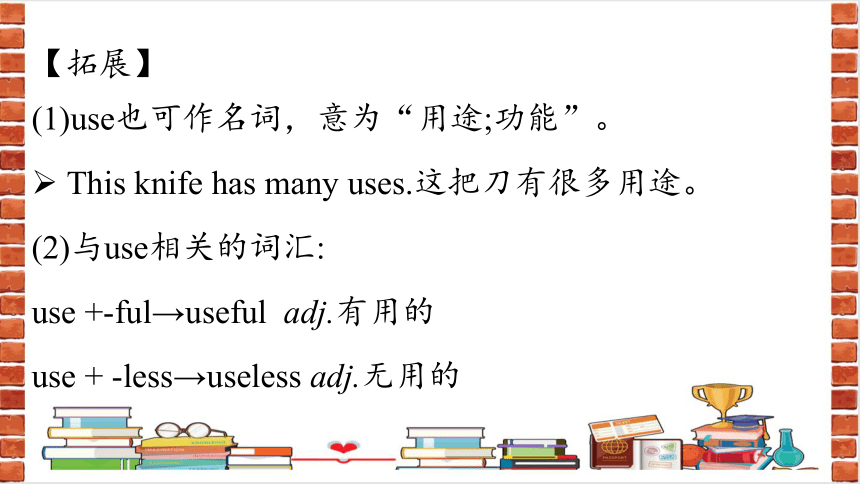
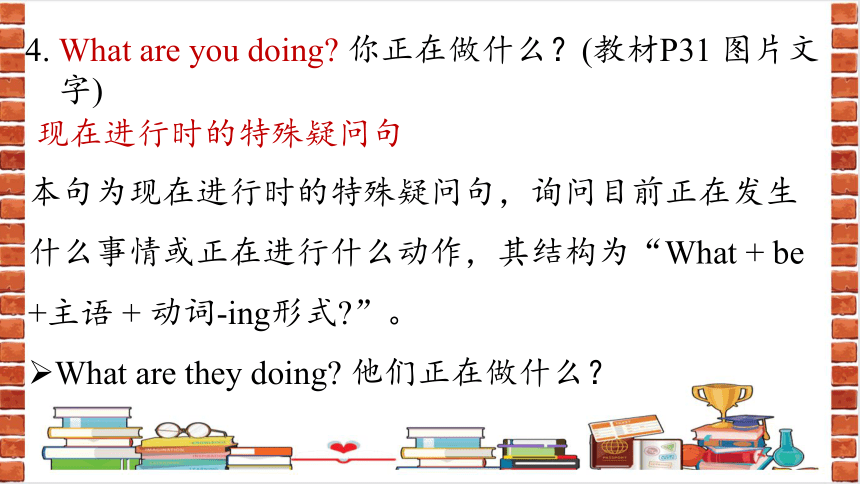
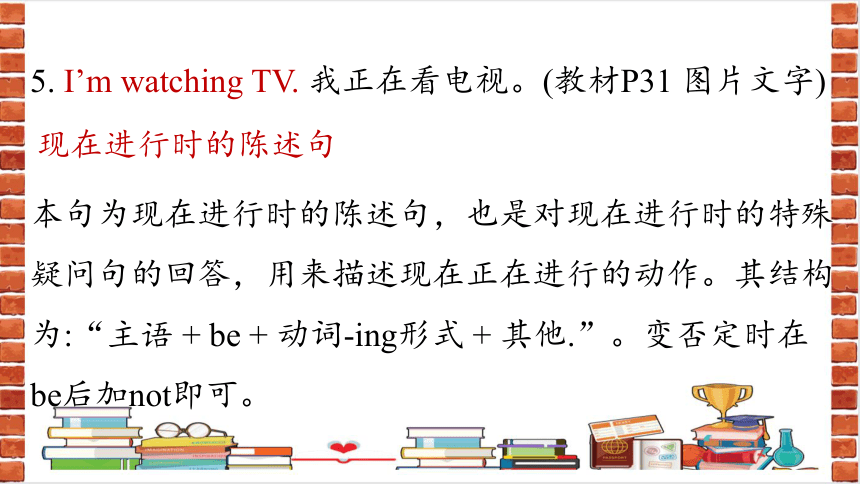
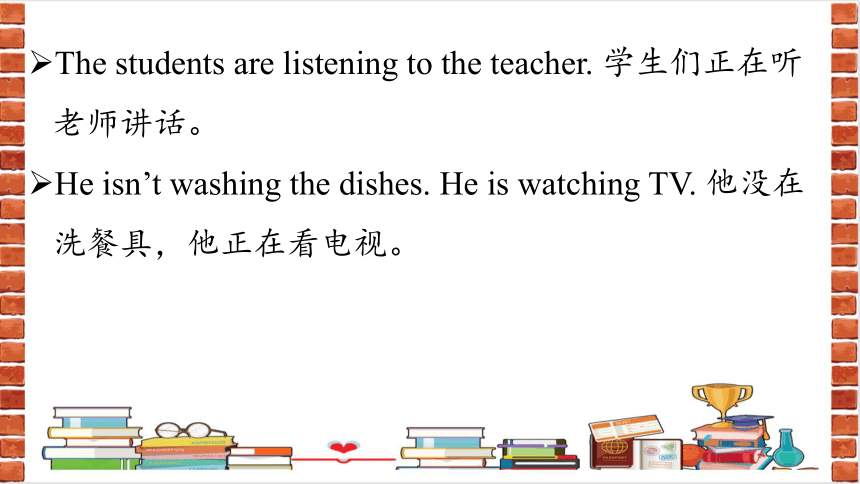
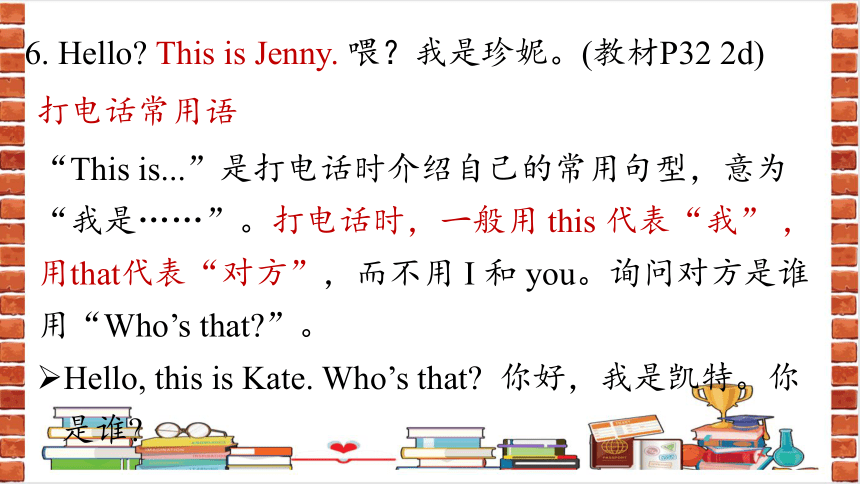
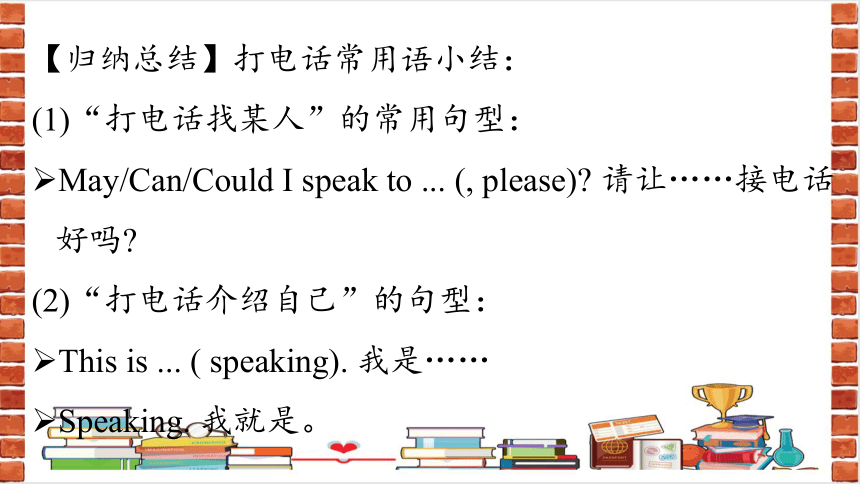
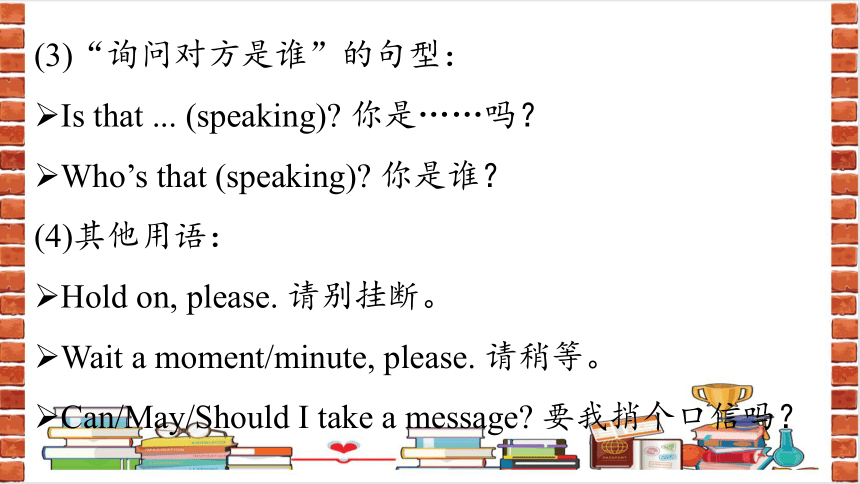
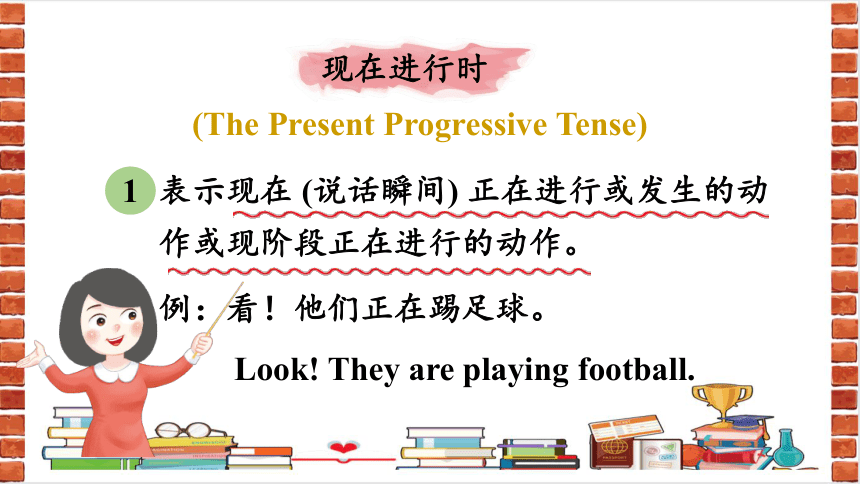
文档简介
(共33张PPT)
Unit 6 I’m watching TV.
重要知识点讲义
newspaper/ nju zpe p /,/ nu z pe p r/ n.报纸
1. reading a newspaper 看报纸 (教材P31 1a)
【易混辨析】in the newspaper与on the newspaper
in the newspaper 强调在报纸上(有什么内容)
on the newspaper 强调(某物压)在报纸上
Look! Your photo is in the newspaper. 看!你的照片上报纸了。
Language points
on the phone 通过电话
2. talking on the phone 通过电话交谈 (教材P31 1a)
on the phone为固定用法,其中介词on意为“通过,使用”。含on的此类短语还有:
on the radio 通过收音机 on the computer 在电脑上
on TV 在电视上 on the Internet 在互联网上
3. using the computer 使用电脑 (教材P31 1a)
use /ju:z/ v.使用;运用
use在此处作及物动词,其后可直接跟宾语。其常用结构为:use sth. to do sth. = use sth. for doing sth.,意为“用某物做某事”。
May I use your bike 我可以用你的自行车吗
I use a knife to cut beef. =I use a knife for cutting beef.我用刀切牛肉。
【拓展】
(1)use也可作名词,意为“用途;功能”。
This knife has many uses.这把刀有很多用途。
(2)与use相关的词汇:
use +-ful→useful adj.有用的
use + -less→useless adj.无用的
现在进行时的特殊疑问句
4. What are you doing 你正在做什么?(教材P31 图片文
字)
本句为现在进行时的特殊疑问句,询问目前正在发生什么事情或正在进行什么动作,其结构为“What + be +主语 + 动词-ing形式 ”。
What are they doing 他们正在做什么?
现在进行时的陈述句
5. I’m watching TV. 我正在看电视。(教材P31 图片文字)
本句为现在进行时的陈述句,也是对现在进行时的特殊疑问句的回答,用来描述现在正在进行的动作。其结构为:“主语 + be + 动词-ing形式 + 其他.”。变否定时在be后加not即可。
The students are listening to the teacher. 学生们正在听老师讲话。
He isn’t washing the dishes. He is watching TV. 他没在洗餐具,他正在看电视。
打电话常用语
6. Hello This is Jenny. 喂?我是珍妮。(教材P32 2d)
“This is...”是打电话时介绍自己的常用句型,意为“我是……”。打电话时,一般用 this 代表“我” ,用that代表“对方”,而不用 I 和 you。询问对方是谁用“Who’s that ”。
Hello, this is Kate. Who’s that 你好,我是凯特。你是谁
【归纳总结】打电话常用语小结:
(1)“打电话找某人”的常用句型:
May/Can/Could I speak to ... (, please) 请让……接电话好吗
(2)“打电话介绍自己”的句型:
This is ... ( speaking). 我是……
Speaking. 我就是。
(3)“询问对方是谁”的句型:
Is that ... (speaking) 你是……吗?
Who’s that (speaking) 你是谁?
(4)其他用语:
Hold on, please. 请别挂断。
Wait a moment/minute, please. 请稍等。
Can/May/Should I take a message 要我捎个口信吗?
表示现在 (说话瞬间) 正在进行或发生的动
作或现阶段正在进行的动作。
(The Present Progressive Tense)
例:看!他们正在踢足球。
Look! They are playing football.
现在进行时
1
现在进行时的结构:be +v.-ing
be(am; is; are)动词的形式要和主语保持一致
例:他们正在下象棋。
They are playing chess.
2
动词的现在分词的变化规律
一般在动词原形后+ing go ask
以不发音的e结尾的, 去e, +ing write take close
以一个辅音字母结尾的重读闭音节动词,双写这一字母+ing get run swim put
going
asking
writing
taking
closing
getting
running
swimming
putting
3
以ie结尾的动词变为现在分词时,要把ie变为y再加-ing。
注意
例:die——dying lie——lying
现在进行时的标志词: now, listen, look等。
例:What are you doing now (你在干什么 )
I’m reading now. (我现在正在读书)
Listen! She is singing. (听, 她正在唱歌)
4
现在进行时态的基本句型:
肯定式结构: be doing
例:她现在正在洗衣服。
She is washing the clothes now.
5
否定式结构: be +not +doing
例:她现在没在洗衣服。
She isn’t washing the clothes now.
一般疑问句结构: 提be至句首
例:她现在正在洗衣服吗?
Is she washing the clothes now
特殊疑问句结构: 疑问词+be+主语+doing
例:她正在做什么?
What is she doing
7. shopping
shop (vi.)“购物”;(n.) “商店” ,现在分词是shopping。shopping作名词时,意为“购物”。
例:我们可以在网上购物。
shopping list 购物清单 go shopping 去购物 do some shopping 购物 shopping center 购物中心
常用短语
We can shop on the Internet.
8. supermarket
由“super(超级的)+market(市场)”构成的合成词。例:superman (超人); superstar(超级明星)。
例:我们镇上有一个超市。
There is a supermarket in my town.
supermarket指“超级市场;自选市场”,往往比store,shop经营规模大,经营时间长。
拓展
9. Is the man swimming in a river
man 是可数名词,意为“男人;人”,其复数形式为men,一般在句中作主语或宾语。
例:我正在与一位男士交谈。
I’m talking to a man.
woman(女人)
women
复数
10. He’s living with an American family in New York. 他和
纽约的一个美国家庭住在一起。(教材P35 2b)
American / mer k n/ adj.美国的;美洲的 n.美国人;美洲人
(1) American在句中作形容词,意为“美国的;美洲的”,其名词形式为America“美国”。
The American boy can answer the question. 这个美国男孩能回答这个问题。
(2) American还可作可数名词,意为“美国人;美洲人”。
She is not an American. 她不是美国人。
11. Today is the Dragon Boat Festival. 今天是端午节。
(教材P35 2b)
the Dragon Boat Festival 端午节
the Dragon Boat Festival是中国的传统节日。其他常见
的中国传统节日的英语表达如下:
春节 the Spring Festival
元宵节 the Lantern Festival
清明节 the Tomb-sweeping Day
中秋节 the Mid-Autumn Festival
重阳节 the Double Ninth Festival
12. …so it’s like any other night for Zhu Hui and his host
family.……所以对朱辉和他的寄宿家庭来说,今晚
就和其他任何一个晚上一样。(教材 P35 2b)
any / eni/ adj. 任何的;任一的 pron. 任何;任一
(1) any在句中作形容词,意为“任何的;任一的”,与可数名词单数连用,通常用于肯定句中。
Take any book you like. 你喜欢哪本书就拿哪本。
(2) any还可作代词,意为“任何;任一”,在句中作主语或宾语。
I’ll take any that you don’t want. 我将拿任何一个你不
要的。
【拓展】any也可与不可数名词或可数名词复数连用,用于否定句或疑问句中,表示“一些”。
Are there any students in the classroom 教室里有学生
吗?
other / (r)/ adj.另外的;其他的 pron.另外的人(或物)
(1) other在句中作形容词,意为“另外的;其他的”,前面通常有any、the、some等限定词。
I can’t visit you now—some other time, maybe. 我现在
不能去拜访你——也许别的时候吧。
13. …so it’s like any other night for Zhu Hui and his host
family.……所以对朱辉和他的寄宿家庭来说,今晚
就和其他任何一个晚上一样。(教材 P35 2b)
(2) other也可作代词,意为“另外的人(或物)”,常以复数others出现。
I don’t like this dress. Please show me some others. 我
不喜欢这件连衣裙,请给我看一些其他的。
any other+单数名词 其他任何的……
该结构指在同一范围内除了某人或某物以外的其他人或物。
Jim runs faster than any other boy in his class. 吉姆比
他班上的其他任何一个男孩都跑得快。
知识小百科:host family 意为“寄宿家庭”,指为家庭成员以外的外国人提供住宿的家庭,通常指为留学生提供住宿的接待家庭。
14. …so it’s like any other night for Zhu Hui and his host
family.……所以对朱辉和他的寄宿家庭来说,今晚
就和其他任何一个晚上一样。(教材 P35 2b)
15. Zhu Hui misses his family and wishes to have his
mom’s delicious zongzi. 朱辉想念他的家人并希望吃
到他妈妈包的美味粽子。(教材 P35 2b)
(1) miss在句中作动词,意为“怀念;思念”,其第三人称单数形式为misses。
I miss my friends in my hometown.我思念我故乡的朋友。
(2) miss作动词,还有“错过;未赶上”之意。
If you don’t get up early, you may miss the early bus. 如果你
不早点起床,你可能会赶不上早班公共汽车。
miss /m s/ v. 怀念;思念;错过
【拓展】Miss意为“小姐,女士”,首字母大写,常用于未婚女子姓氏前,也可作为学生对女教师的称呼。
I’d like to see Miss Smith. 我想见一下史密斯小姐。
Good morning, Miss Wang! 早上好,王老师!
Here is a picture of my family.
本句是由here开头的倒装句。在以副词here或there开头的倒装句中,谓语动词的单复数应由后面的真正主语决定。
Here _____ some new books.
Here _____ my schoolbag.
are
is
Thanks for your attention!
Unit 6 I’m watching TV.
重要知识点讲义
newspaper/ nju zpe p /,/ nu z pe p r/ n.报纸
1. reading a newspaper 看报纸 (教材P31 1a)
【易混辨析】in the newspaper与on the newspaper
in the newspaper 强调在报纸上(有什么内容)
on the newspaper 强调(某物压)在报纸上
Look! Your photo is in the newspaper. 看!你的照片上报纸了。
Language points
on the phone 通过电话
2. talking on the phone 通过电话交谈 (教材P31 1a)
on the phone为固定用法,其中介词on意为“通过,使用”。含on的此类短语还有:
on the radio 通过收音机 on the computer 在电脑上
on TV 在电视上 on the Internet 在互联网上
3. using the computer 使用电脑 (教材P31 1a)
use /ju:z/ v.使用;运用
use在此处作及物动词,其后可直接跟宾语。其常用结构为:use sth. to do sth. = use sth. for doing sth.,意为“用某物做某事”。
May I use your bike 我可以用你的自行车吗
I use a knife to cut beef. =I use a knife for cutting beef.我用刀切牛肉。
【拓展】
(1)use也可作名词,意为“用途;功能”。
This knife has many uses.这把刀有很多用途。
(2)与use相关的词汇:
use +-ful→useful adj.有用的
use + -less→useless adj.无用的
现在进行时的特殊疑问句
4. What are you doing 你正在做什么?(教材P31 图片文
字)
本句为现在进行时的特殊疑问句,询问目前正在发生什么事情或正在进行什么动作,其结构为“What + be +主语 + 动词-ing形式 ”。
What are they doing 他们正在做什么?
现在进行时的陈述句
5. I’m watching TV. 我正在看电视。(教材P31 图片文字)
本句为现在进行时的陈述句,也是对现在进行时的特殊疑问句的回答,用来描述现在正在进行的动作。其结构为:“主语 + be + 动词-ing形式 + 其他.”。变否定时在be后加not即可。
The students are listening to the teacher. 学生们正在听老师讲话。
He isn’t washing the dishes. He is watching TV. 他没在洗餐具,他正在看电视。
打电话常用语
6. Hello This is Jenny. 喂?我是珍妮。(教材P32 2d)
“This is...”是打电话时介绍自己的常用句型,意为“我是……”。打电话时,一般用 this 代表“我” ,用that代表“对方”,而不用 I 和 you。询问对方是谁用“Who’s that ”。
Hello, this is Kate. Who’s that 你好,我是凯特。你是谁
【归纳总结】打电话常用语小结:
(1)“打电话找某人”的常用句型:
May/Can/Could I speak to ... (, please) 请让……接电话好吗
(2)“打电话介绍自己”的句型:
This is ... ( speaking). 我是……
Speaking. 我就是。
(3)“询问对方是谁”的句型:
Is that ... (speaking) 你是……吗?
Who’s that (speaking) 你是谁?
(4)其他用语:
Hold on, please. 请别挂断。
Wait a moment/minute, please. 请稍等。
Can/May/Should I take a message 要我捎个口信吗?
表示现在 (说话瞬间) 正在进行或发生的动
作或现阶段正在进行的动作。
(The Present Progressive Tense)
例:看!他们正在踢足球。
Look! They are playing football.
现在进行时
1
现在进行时的结构:be +v.-ing
be(am; is; are)动词的形式要和主语保持一致
例:他们正在下象棋。
They are playing chess.
2
动词的现在分词的变化规律
一般在动词原形后+ing go ask
以不发音的e结尾的, 去e, +ing write take close
以一个辅音字母结尾的重读闭音节动词,双写这一字母+ing get run swim put
going
asking
writing
taking
closing
getting
running
swimming
putting
3
以ie结尾的动词变为现在分词时,要把ie变为y再加-ing。
注意
例:die——dying lie——lying
现在进行时的标志词: now, listen, look等。
例:What are you doing now (你在干什么 )
I’m reading now. (我现在正在读书)
Listen! She is singing. (听, 她正在唱歌)
4
现在进行时态的基本句型:
肯定式结构: be doing
例:她现在正在洗衣服。
She is washing the clothes now.
5
否定式结构: be +not +doing
例:她现在没在洗衣服。
She isn’t washing the clothes now.
一般疑问句结构: 提be至句首
例:她现在正在洗衣服吗?
Is she washing the clothes now
特殊疑问句结构: 疑问词+be+主语+doing
例:她正在做什么?
What is she doing
7. shopping
shop (vi.)“购物”;(n.) “商店” ,现在分词是shopping。shopping作名词时,意为“购物”。
例:我们可以在网上购物。
shopping list 购物清单 go shopping 去购物 do some shopping 购物 shopping center 购物中心
常用短语
We can shop on the Internet.
8. supermarket
由“super(超级的)+market(市场)”构成的合成词。例:superman (超人); superstar(超级明星)。
例:我们镇上有一个超市。
There is a supermarket in my town.
supermarket指“超级市场;自选市场”,往往比store,shop经营规模大,经营时间长。
拓展
9. Is the man swimming in a river
man 是可数名词,意为“男人;人”,其复数形式为men,一般在句中作主语或宾语。
例:我正在与一位男士交谈。
I’m talking to a man.
woman(女人)
women
复数
10. He’s living with an American family in New York. 他和
纽约的一个美国家庭住在一起。(教材P35 2b)
American / mer k n/ adj.美国的;美洲的 n.美国人;美洲人
(1) American在句中作形容词,意为“美国的;美洲的”,其名词形式为America“美国”。
The American boy can answer the question. 这个美国男孩能回答这个问题。
(2) American还可作可数名词,意为“美国人;美洲人”。
She is not an American. 她不是美国人。
11. Today is the Dragon Boat Festival. 今天是端午节。
(教材P35 2b)
the Dragon Boat Festival 端午节
the Dragon Boat Festival是中国的传统节日。其他常见
的中国传统节日的英语表达如下:
春节 the Spring Festival
元宵节 the Lantern Festival
清明节 the Tomb-sweeping Day
中秋节 the Mid-Autumn Festival
重阳节 the Double Ninth Festival
12. …so it’s like any other night for Zhu Hui and his host
family.……所以对朱辉和他的寄宿家庭来说,今晚
就和其他任何一个晚上一样。(教材 P35 2b)
any / eni/ adj. 任何的;任一的 pron. 任何;任一
(1) any在句中作形容词,意为“任何的;任一的”,与可数名词单数连用,通常用于肯定句中。
Take any book you like. 你喜欢哪本书就拿哪本。
(2) any还可作代词,意为“任何;任一”,在句中作主语或宾语。
I’ll take any that you don’t want. 我将拿任何一个你不
要的。
【拓展】any也可与不可数名词或可数名词复数连用,用于否定句或疑问句中,表示“一些”。
Are there any students in the classroom 教室里有学生
吗?
other / (r)/ adj.另外的;其他的 pron.另外的人(或物)
(1) other在句中作形容词,意为“另外的;其他的”,前面通常有any、the、some等限定词。
I can’t visit you now—some other time, maybe. 我现在
不能去拜访你——也许别的时候吧。
13. …so it’s like any other night for Zhu Hui and his host
family.……所以对朱辉和他的寄宿家庭来说,今晚
就和其他任何一个晚上一样。(教材 P35 2b)
(2) other也可作代词,意为“另外的人(或物)”,常以复数others出现。
I don’t like this dress. Please show me some others. 我
不喜欢这件连衣裙,请给我看一些其他的。
any other+单数名词 其他任何的……
该结构指在同一范围内除了某人或某物以外的其他人或物。
Jim runs faster than any other boy in his class. 吉姆比
他班上的其他任何一个男孩都跑得快。
知识小百科:host family 意为“寄宿家庭”,指为家庭成员以外的外国人提供住宿的家庭,通常指为留学生提供住宿的接待家庭。
14. …so it’s like any other night for Zhu Hui and his host
family.……所以对朱辉和他的寄宿家庭来说,今晚
就和其他任何一个晚上一样。(教材 P35 2b)
15. Zhu Hui misses his family and wishes to have his
mom’s delicious zongzi. 朱辉想念他的家人并希望吃
到他妈妈包的美味粽子。(教材 P35 2b)
(1) miss在句中作动词,意为“怀念;思念”,其第三人称单数形式为misses。
I miss my friends in my hometown.我思念我故乡的朋友。
(2) miss作动词,还有“错过;未赶上”之意。
If you don’t get up early, you may miss the early bus. 如果你
不早点起床,你可能会赶不上早班公共汽车。
miss /m s/ v. 怀念;思念;错过
【拓展】Miss意为“小姐,女士”,首字母大写,常用于未婚女子姓氏前,也可作为学生对女教师的称呼。
I’d like to see Miss Smith. 我想见一下史密斯小姐。
Good morning, Miss Wang! 早上好,王老师!
Here is a picture of my family.
本句是由here开头的倒装句。在以副词here或there开头的倒装句中,谓语动词的单复数应由后面的真正主语决定。
Here _____ some new books.
Here _____ my schoolbag.
are
is
Thanks for your attention!
同课章节目录
- Unit 1 Can you play the guitar?
- Section A
- Section B
- Unit 2 What time do you go to school?
- Section A
- Section B
- Unit 3 How do you get to school?
- Section A
- Section B
- Unit 4 Don't eat in class.
- Section A
- Section B
- Unit 5 Why do you like pandas?
- Section A
- Section B
- Unit 6 I'm watching TV.
- Section A
- Section B
- Review of Units 1-6
- Unit 7 It's raining!
- Section A
- Section B
- Unit 8 Is there a post office near here?
- Section A
- Section B
- Unit 9 What does he look like?
- Section A
- Section B
- Unit 10 I'd like some noodles.
- Section A
- Section B
- Unit 11 How was your school trip?
- Section A
- Section B
- Unit 12 What did you do last weekend?
- Section A
- Section B
